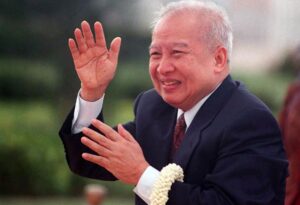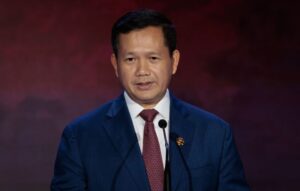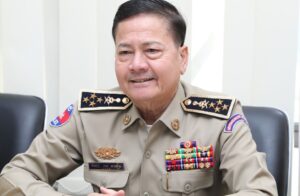Note: Cambodia uses a Prime Minister as the head of government, not a President.
| Name | Tenure |
|---|---|
| Norodom Sihanouk | 18 March 1945 - 18 March 1953 |
| Sisowath Youtevong | 18 March 1953 - 24 September 1955 |
| Norodom Sihanouk | 24 September 1955 - 18 March 1960 |
| Sangkum Reastr Niyum | 18 March 1960 - 18 March 1966 |
| Lon Nol | 18 March 1966 - 18 March 1972 |
| Cheng Heng | 18 March 1972 - 11 April 1973 |
| Prince Sisowath Sirik Matak | 11 April 1973 - 18 March 1975 |
| Khmer Rouge (Pol Pot) | 18 March 1975 - 7 January 1979 |
| Pen Sovan | 7 January 1979 - 27 June 1981 |
| Chan Sy | 9 February 1982 - 26 December 1984 |
| Hun Sen | 26 December 1984 - 14 January 1985 |
| Norodom Ranariddh | 2 July 1993 - 6 August 1997 |
| Hun Sen | 24 September 1993 - 30 November 1998 |
| Ung Huot | 6 August 1997 - 30 November 1998 |
| Hun Sen | 30 November 1998 - 22 August 2023 |
| Hun Manet | 22 August 2023 - Present |
READ ALSO: List of Prime Ministers That Ruled Saudi Arabia Till Date
First Prime Minister of Cambodia: Norodom Sihanouk

Norodom Sihanouk was the first Prime Minister of Cambodia, serving from March 18, 1945, to March 18, 1953. He was born on October 31, 1922, into the Cambodian royal family.
Sihanouk’s early political career began as a monarch, but he transitioned into a more active political role during the country’s struggle for independence from French colonial rule.
Sihanouk held various titles, including King of Cambodia and Head of State. His leadership style was characterized by a blend of nationalism and authoritarianism.
He was instrumental in negotiating Cambodia’s independence in 1953 and established the Sangkum Reastr Niyum political movement, which aimed to unify the country under a nationalist agenda.
Notable Achievements
1. Independence from France: Sihanouk played a crucial role in leading Cambodia to independence in 1953, which was a significant achievement for the nation.
2. Cultural Renaissance: During his reign, he promoted Cambodian culture and arts, contributing to a cultural renaissance that celebrated the country’s heritage.
Downsides
1. Authoritarian Rule: Sihanouk’s governance style was often criticized for being authoritarian, as he suppressed political dissent and opposition parties.
2. Civil Unrest: His inability to manage rising political tensions eventually led to civil unrest, which contributed to the rise of the Khmer Rouge.
READ ALSO: Presidents That Have Ruled Uzbekistan Till Date
Current Prime Minister of Cambodia: Hun Manet

Hun Manet has been the Prime Minister of Cambodia since August 22, 2023. Born on December 20, 1977, he is the son of former Prime Minister Hun Sen, who held the position for 38 years. Manet was educated in the United States and holds a Ph.D. in economics.
Before becoming Prime Minister, Hun Manet served as the Deputy Commander of the Royal Cambodian Armed Forces and held various ministerial roles, including Minister of Defense. His military background and education have shaped his approach to governance.
Notable Achievements
1. Continuity of Governance: Manet’s ascension to the premiership represents continuity in governance, as he has pledged to uphold his father’s policies while addressing modernization and economic development.
2. Focus on Youth: He has emphasized the importance of youth engagement in politics and governance, aiming to inspire a new generation of leaders.
Downsides
1. Political Legacy: Manet faces the challenge of overcoming the political legacy of his father, which includes allegations of authoritarianism and human rights abuses.
2. Economic Challenges: He must navigate Cambodia’s economic challenges, particularly in the wake of the COVID-19 pandemic, and ensure sustainable development.
READ ALSO: Presidents That Have Ruled Azerbaijan Till Date
Current Deputy Prime Minister: Neth Savoeun

Neth Savoeun is the current Deputy Prime Minister of Cambodia, having been appointed on August 22, 2023. He is also known for his previous role as the National Police Chief, a position he held prior to his current appointment.
Neth Savoeun was born on February 15, 1983. He has a military background and extensive experience in law enforcement, which has shaped his approach to governance and public safety.
His rise in the political landscape is closely linked to the influence of his uncle, former Prime Minister Hun Sen, as well as the broader context of the Cambodian People’s Party (CPP), which has maintained a strong grip on power in the country.
Notable Achievements
1. Law Enforcement Reforms: As the National Police Chief, Savoeun implemented various reforms aimed at modernizing the police force and improving public safety. His efforts included enhancing training programs for police officers and increasing community engagement.
2. Strengthening Security: During his tenure as police chief, he focused on combating crime and ensuring national security, which are critical issues in Cambodia. His leadership contributed to a decrease in certain types of crime, making urban areas safer.
3. International Cooperation: Savoeun has emphasized the importance of international collaboration in addressing transnational crime, including drug trafficking and human trafficking. His efforts have fostered stronger ties with law enforcement agencies in neighboring countries.
Downsides
1. Criticism of Human Rights Practices: Savoeun’s tenure has not been without controversy. Critics have highlighted concerns regarding human rights abuses within the police force, including allegations of excessive use of force and suppression of dissent. These issues have raised questions about the commitment to civil liberties in Cambodia.
2. Political Patronage: His rise in the political hierarchy is seen by some as part of a broader trend of nepotism within the CPP. This perception may undermine public trust in governance and fuel criticism regarding the concentration of power among a few elite families.
3. Challenges in Public Perception: While he has made strides in law enforcement, public perception remains mixed, particularly among those who advocate for greater accountability and transparency in government institutions.
